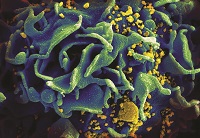 Photo Courtesy of NIAID; https://www.flickr.com/photos/niaid/6813489183/
Photo Courtesy of NIAID; https://www.flickr.com/photos/niaid/6813489183/
Bio-Rad Gets FDA Approval for Test to Differentiate Between Types of HIV Infection
The Food and Drug Administration (FDA) has approved the Bio-Rad BioPlex 2200 HIV Ag-Ab assay, making this the first FDA-approved diagnostic that differentiates between HIV-1 antibodies, HIV-2 antibodies, and HIV-1 p24 antigen in human serum of plasma specimens. While the distinct diseases caused by HIV-1 and HIV-2 exhibit the same symptoms, it is important to be able to differentiate between them early because they progress at different rates. In addition to aiding in the diagnosis of infection with HIV-1 and/or HIV-2, Bio-Rad’s test also reports the results of HIV antigen and antibody detection separately, enabling healthcare providers to differentiate between acute and established HIV-1 infection. Acute HIV-1 infection is identified when a blood specimen is positive for HIV-1 p24 antigen, which appears early in the course of infection, but is negative for HIV-1 and HIV-2 antibodies, which appear later.
The Bio-Rad BioPlex 2200 HIV Ag-Ab assay is intended for use with the BioPlex 2200 system and may be used in adults, children 2 years of age and older, and pregnant women. The test may also be used to screen organ donors for HIV-1/2 when the blood specimen is collected while the donor’s heart is still beating. However, the assay is not approved for use in screening blood or plasma donors, except in urgent situations where traditional licensed blood donor screening tests are unavailable or their use is impractical.
FDA Clears Theranos Finger Stick Technology, System, and Herpes Test
Theranos has received Food and Drug Administration (FDA) clearance for its patented finger stick and venous blood testing technology, its test system, and an assay for herpes simplex 1 virus (HSV-1) IgG. Theranos provided study data from 818 subjects of varying ages and ethnicities, demonstrating that its system could be run accurately using only a finger stick as well as a traditional venous draw compared to an FDA-cleared, commercially available reference method.
The FDA clearance also includes the use of Theranos nanotainer tubes for tests run on the Theranos system, which enable blood samples to be collected from a fingerprick, as well as Theranos analytical software.
FDA Approves Qiagen Companion Diagnostic for Use With AstraZeneca Treatment
Qiagen has received Food and Drug Administration (FDA) approval of its therascreen EGFR RGQ PCR kit for use as a companion diagnostic to guide treatment with the lung cancer therapeutic Iressa (gefitinib). Developed by AstraZeneca, Iressa was approved in tandem with Qiagen’s test and is used to treat patients with advanced or metastatic non-small cell lung cancer (NSCLC). Through analysis of tissue from lung tumors, the therascreen EGFR test enables doctors to identify NSCLC patients whose tumors are positive for epidermal growth factor receptor (EGFR) mutations and are therefore most likely to respond to this drug. Iressa is the second therapeutic used in NSCLC patients that the therascreen EGFR test has been approved for use with since 2013.
FDA Gives Nod to Connective Tissue Disease Assays, Antiphospholipid Syndrome Marker
Inova Diagnostics has received 510(k) clearance from the Food and Drug Administration (FDA) for several Quanta Flash extractable nuclear antigen assays that aid in the diagnosis of connective tissue diseases like systemic lupus erythematosus, Sjogren’s syndrome, and systemic sclerosis. In addition, FDA cleared Inova’s test for Quanta Flash Beta-2 Glycoprotein1 Domain1 (Beta-2GP1 Domain1), a highly specific marker that, in conjunction with clinical and other laboratory findings, can aid in the diagnosis of antiphospholipid syndrome (APS).
All of these newly cleared assays are designed to run on Inova’s Bio-Flash chemiluminescent analyzer for autoimmune testing.